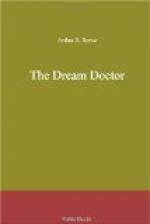“I know,” I replied, “but this six-cylindered existence for a week wears you out.”
“My dear boy,” he persisted, “if I had turned some one else loose on that story, he’d have been dead. Go to it—it’s fine.”
It was a bit of blarney, I knew. But somehow or other I liked it. It was just what I needed to encourage me, and I hurried uptown promising myself a sound sleep at any rate.
“Very good,” remarked Kennedy the next morning, poking his head in at my door and holding up a copy of the Star into which a very accurate brief account of the affair had been dropped at the last moment. “I’m going over to the laboratory. See you there as soon as you can get over.”
“Craig,” I remarked an hour or so later as I sauntered in on him, hard at work, “I don’t see how you stand this feverish activity.”
“Stand it?” he repeated, holding up a beaker to the light to watch a reaction. “It’s my very life. Stand it? Why, man, if you want me to pass away—stop it. As long as it lasts, I shall be all right. Let it quit and I’ll—I’ll go back to research work,” he laughed.
Evidently he had been waiting for me, for as he talked, he laid aside the materials with which he had been working and was preparing to go out.
“Then, too,” he went on, “I like to be with people like Spencer and Brixton. For example, while I was waiting here for you, there came a call from Emery Pitts.”
“Emery Pitts?” I echoed. “What does he want?”
“The best way to find out is—to find out,” he answered simply. “It’s getting late and I promised to be there directly. I think we’d better take a taxi.”
A few minutes later we were ushered into a large Fifth Avenue mansion and were listening to a story which interested even Kennedy.
“Not even a blood spot has been disturbed in the kitchen. Nothing has been altered since the discovery of the murdered chef, except that his body has been moved into the next room.”
Emery Pitts, one of the “thousand millionaires of steel,” overwrought as he was by a murder in his own household, sank back in his easy-chair, exhausted.
Pitts was not an old man; indeed, in years he was in the prime of life. Yet by his looks he might almost have been double his age, the more so in contrast with Minna Pitts, his young and very pretty wife, who stood near him in the quaint breakfast-room and solicitously moved a pillow back of his head.
Kennedy and I looked on in amazement. We knew that he had recently retired from active business, giving as a reason his failing health. But neither of us had thought, when the hasty summons came early that morning to visit him immediately at his house, that his condition was as serious as it now appeared.
“In the kitchen?” repeated Kennedy, evidently not prepared for any trouble in that part of the house.
Pitts, who had closed his eyes, now reopened them slowly and I noticed how contracted were the pupils.




